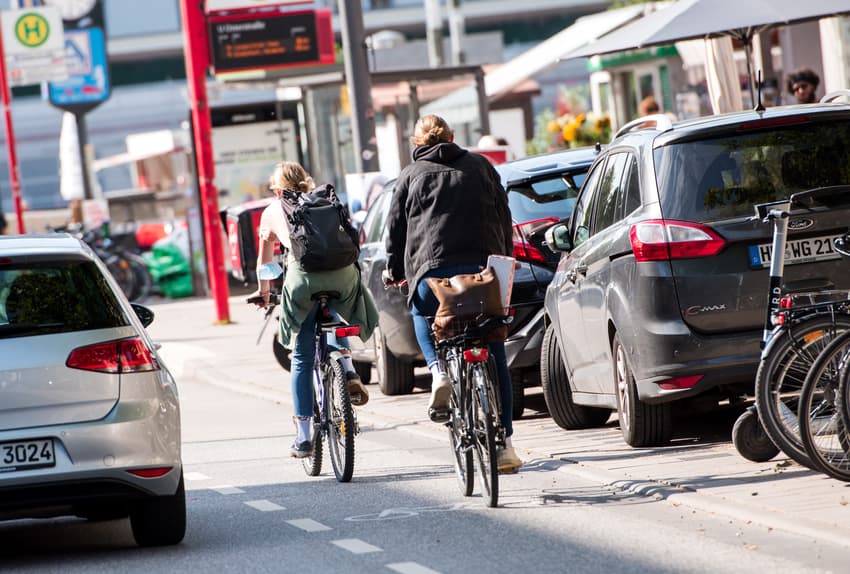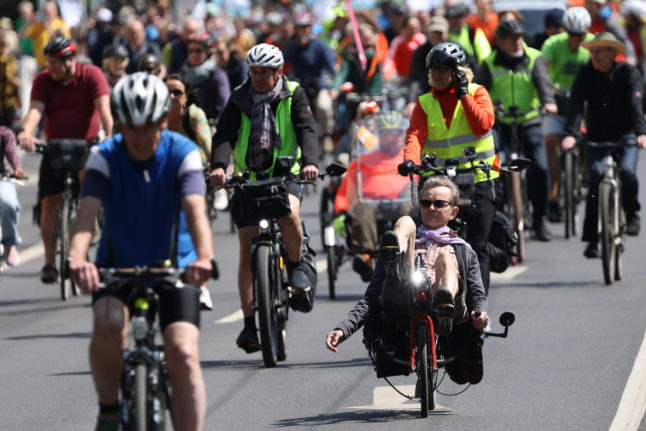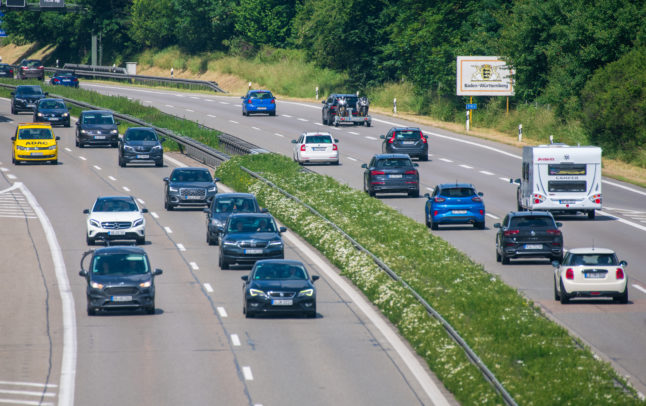Will Germany's motorists and cyclists ever learn to live with each other?

It's more important than ever that Germany's two distinct tribes - drivers and cyclists - learn to accept each other rather than being stuck in constant road rage, explains Brian Melican.
Another week, another discussion about whether Germany has become too bike-friendly or, on the contrary, is still a country where the car is king – a cruel monarch who, day in, day out exacts a deathly toll on cyclists, pedestrians, and indeed anyone who likes to breathe air. To those of us with a high proportion of Germans in our Twitter feeds, this debate is nothing new; now, thanks to the fact that the populist think-pieces of Bild are now available in English (Who knew?), the long-running ideological slanging match between drivers and riders is now there for all to follow. Oh, joy!
Seriously madenning Bild article on how cargo bikes take too much space in cities where the infrastructure is not fit for them...
...illustrated by a picture where most of the carriage AND footpath space is taken up by cars 🤦♂️ pic.twitter.com/0CWyKsmPBp
— Giulio Mattioli (@giulio_mattioli) June 15, 2022
For many who move to Germany, the country appears, at first sight, to be firmly in the grip of cyclists. Especially in the university towns of the flat north such as Münster, Göttingen, or Braunschweig, the sheer number of visible bikes is remarkable, and even in Hamburg and Berlin, there are cycles lanes seemingly everywhere along which a constant stream of ruddy-cheeked individuals plying their pedals, making liberal use of their bells. Coming fresh from London or Paris, the contrast is striking – and you run a not insignificant risk of being mowed down when standing on the wrong bit of the pavement.
Yet to those who move here from Amsterdam or Copenhagen, Germany looks like a place where cyclists are treated as an unwelcome nuisance by traffic planners and as fair game by unscrupulous motorists with a pronounced taste for speed. The very fact that most cycle lanes are on pavements, for instance, strikes them as strange. Surely the best place for bicycles is well away from pedestrians? What is more, the large amounts of the carriageway space taken up by cars – either in motion or stationary – seem jarring coming from countries which have long prioritised cycling over driving in built-up environments.
As ever, the truth of the matter lies somewhere in between. And, as so often, we Germans have a marked tendency get into endless, cyclical arguments about points of principle and prove unable to learn to live with our contradictions.
READ ALSO: Road rage in Berlin as cyclists clog streets in pandemic

Cyclists at a demonstration in Düsseldorf in May. Photo: picture alliance/dpa | David Young
Speeders' paradise and cycling favourite
For Germany is, in traffic terms, contradictory. It is at once Europe’s automobile mecca, with the continent’s largest car industry and famously speed-limit-free Autobahns. It's also one of Europe’s foremost cycling nations in which families routinely bike miles for weekend recreation and the country that gave the world Standlichtfunktion (rear bike lights which remain on when stationary). It's home to various premium and mass-market manufacturers, behind only China, Taiwan, and the Netherlands in terms of bicycle production and export.
This becomes clear when comparing the bikes Germans ride to those of our European neighbours. Generalisations being odious, the average UK bicycle is a mountain bike poorly suited, in typical British fashion, to the use its owner is making of it: that’s why London businessmen ride into work with their suits in grubby rucksacks with tell-tale streaks of mud up the back and why they are continually scraping around for batteries to put in clip-on lights which inevitably fall off and smash halfway. French households, if at all, have sleek, spotless racing bikes reserved for sporting use in the evenings and at weekends. Otherwise, city-dwellers use widely-available rental bikes – unless it is raining, too warm, too cold, or too windy, or in any other way preferable to not do so. On the other end of the scale, the Dutch and the Danes have workhorse bikes which can fit everything from small children and large dogs through to IKEA flat-pack furniture.
READ ALSO: German state ministers push for Autobahn speed limit
The average German bike, meanwhile, is an all-in-one mountain-cum-city-bike (“Trekkingrad”) with the attention to practical detail for which the country is famous: fitted dynamo-driven lights as standard, a frame over the back wheel onto which weather-proof saddle bags can be clipped, and mudguards over both wheels; it will have at least 21 gears, the highest of which will enable someone in good physical health to do at least 15mph on flats and, increasingly, an electric motor to help it go even faster. Germans build bikes like they build cars: to get you and your stuff comfortably and speedily from A to B. This, by the way, explains the increasing popularity of the pedelec cargo-bikes at the root of the current controversy: they do more or less all the things a car does.
High standards - whatever the transport mode
And this is the nub of the issue: Germans – whether in cars or on bikes – have high standards when it comes to transportation and are congenitally impatient (see also queuing behaviour and ALDI cashiers). When in our cars, we expect to be able to bomb down pot-hole free roads at a minimum of 30mph (and preferably more) and then immediately find a parking space wherever we end up; any impediment to our right of way is taken as a personal insult; pedestrians must cross at designated points or risk death.
READ ALSO: Is it ever acceptable to cross the road at red light in Germany?

People drive on the Autobahn in Laichingen in Baden-Württemberg. Photo: picture alliance/dpa | Stefan Puchner
And when on our bicycles, we Germans exhibit exactly the same traits: we expect absolutely obstacle-free cycle paths and bike lanes, ample stands and racks wherever we dismount, and are genuinely angry when anyone – on four, on two wheels, or on foot – gets in our way. To give you an idea of just how exacting we Germans are of each other here: I was once, in the driving Hamburg rain, tailgated all the way down the bike lane along Glacischaussee by a woman who, when we stopped at the lights, told me that my mudguard was “antisocial” (asozial) because it, in her opinion, didn’t go far down enough over my back wheel, meaning that she was getting spray in her face. It simply didn’t occur to her to just ride further back or overtake me.
Unfortunately, of course, there is nowhere near enough space in German cities for both those in cars and those on bicycles to be able to drive and ride exactly the way they would like to at all times – without, that is, getting rid of pedestrians entirely (potentially one thing the two groups might agree on). And so we are stuck with groups of road and pavement users shouting abuse at each other (“Verkehrsrowdy!” – road-hog; “Schleicher!” - slowcoach) rather than learning to show consideration, adapt to sub-optimal conditions, and react to unforeseen circumstances. In my own view, the sooner we ban cars entirely from city centres and reclaim the streets for those of us using healthy, emissions-free transport, the better; in the meantime, however, life is too short to be shouting at each other – and could be even shorter for some of us if we all keep trying to do top speed in the same spaces.
Comments (2)
See Also
Another week, another discussion about whether Germany has become too bike-friendly or, on the contrary, is still a country where the car is king – a cruel monarch who, day in, day out exacts a deathly toll on cyclists, pedestrians, and indeed anyone who likes to breathe air. To those of us with a high proportion of Germans in our Twitter feeds, this debate is nothing new; now, thanks to the fact that the populist think-pieces of Bild are now available in English (Who knew?), the long-running ideological slanging match between drivers and riders is now there for all to follow. Oh, joy!
Seriously madenning Bild article on how cargo bikes take too much space in cities where the infrastructure is not fit for them...
— Giulio Mattioli (@giulio_mattioli) June 15, 2022
...illustrated by a picture where most of the carriage AND footpath space is taken up by cars 🤦♂️ pic.twitter.com/0CWyKsmPBp
For many who move to Germany, the country appears, at first sight, to be firmly in the grip of cyclists. Especially in the university towns of the flat north such as Münster, Göttingen, or Braunschweig, the sheer number of visible bikes is remarkable, and even in Hamburg and Berlin, there are cycles lanes seemingly everywhere along which a constant stream of ruddy-cheeked individuals plying their pedals, making liberal use of their bells. Coming fresh from London or Paris, the contrast is striking – and you run a not insignificant risk of being mowed down when standing on the wrong bit of the pavement.
Yet to those who move here from Amsterdam or Copenhagen, Germany looks like a place where cyclists are treated as an unwelcome nuisance by traffic planners and as fair game by unscrupulous motorists with a pronounced taste for speed. The very fact that most cycle lanes are on pavements, for instance, strikes them as strange. Surely the best place for bicycles is well away from pedestrians? What is more, the large amounts of the carriageway space taken up by cars – either in motion or stationary – seem jarring coming from countries which have long prioritised cycling over driving in built-up environments.
As ever, the truth of the matter lies somewhere in between. And, as so often, we Germans have a marked tendency get into endless, cyclical arguments about points of principle and prove unable to learn to live with our contradictions.
READ ALSO: Road rage in Berlin as cyclists clog streets in pandemic

Speeders' paradise and cycling favourite
For Germany is, in traffic terms, contradictory. It is at once Europe’s automobile mecca, with the continent’s largest car industry and famously speed-limit-free Autobahns. It's also one of Europe’s foremost cycling nations in which families routinely bike miles for weekend recreation and the country that gave the world Standlichtfunktion (rear bike lights which remain on when stationary). It's home to various premium and mass-market manufacturers, behind only China, Taiwan, and the Netherlands in terms of bicycle production and export.
This becomes clear when comparing the bikes Germans ride to those of our European neighbours. Generalisations being odious, the average UK bicycle is a mountain bike poorly suited, in typical British fashion, to the use its owner is making of it: that’s why London businessmen ride into work with their suits in grubby rucksacks with tell-tale streaks of mud up the back and why they are continually scraping around for batteries to put in clip-on lights which inevitably fall off and smash halfway. French households, if at all, have sleek, spotless racing bikes reserved for sporting use in the evenings and at weekends. Otherwise, city-dwellers use widely-available rental bikes – unless it is raining, too warm, too cold, or too windy, or in any other way preferable to not do so. On the other end of the scale, the Dutch and the Danes have workhorse bikes which can fit everything from small children and large dogs through to IKEA flat-pack furniture.
READ ALSO: German state ministers push for Autobahn speed limit
The average German bike, meanwhile, is an all-in-one mountain-cum-city-bike (“Trekkingrad”) with the attention to practical detail for which the country is famous: fitted dynamo-driven lights as standard, a frame over the back wheel onto which weather-proof saddle bags can be clipped, and mudguards over both wheels; it will have at least 21 gears, the highest of which will enable someone in good physical health to do at least 15mph on flats and, increasingly, an electric motor to help it go even faster. Germans build bikes like they build cars: to get you and your stuff comfortably and speedily from A to B. This, by the way, explains the increasing popularity of the pedelec cargo-bikes at the root of the current controversy: they do more or less all the things a car does.
High standards - whatever the transport mode
And this is the nub of the issue: Germans – whether in cars or on bikes – have high standards when it comes to transportation and are congenitally impatient (see also queuing behaviour and ALDI cashiers). When in our cars, we expect to be able to bomb down pot-hole free roads at a minimum of 30mph (and preferably more) and then immediately find a parking space wherever we end up; any impediment to our right of way is taken as a personal insult; pedestrians must cross at designated points or risk death.
READ ALSO: Is it ever acceptable to cross the road at red light in Germany?

And when on our bicycles, we Germans exhibit exactly the same traits: we expect absolutely obstacle-free cycle paths and bike lanes, ample stands and racks wherever we dismount, and are genuinely angry when anyone – on four, on two wheels, or on foot – gets in our way. To give you an idea of just how exacting we Germans are of each other here: I was once, in the driving Hamburg rain, tailgated all the way down the bike lane along Glacischaussee by a woman who, when we stopped at the lights, told me that my mudguard was “antisocial” (asozial) because it, in her opinion, didn’t go far down enough over my back wheel, meaning that she was getting spray in her face. It simply didn’t occur to her to just ride further back or overtake me.
Unfortunately, of course, there is nowhere near enough space in German cities for both those in cars and those on bicycles to be able to drive and ride exactly the way they would like to at all times – without, that is, getting rid of pedestrians entirely (potentially one thing the two groups might agree on). And so we are stuck with groups of road and pavement users shouting abuse at each other (“Verkehrsrowdy!” – road-hog; “Schleicher!” - slowcoach) rather than learning to show consideration, adapt to sub-optimal conditions, and react to unforeseen circumstances. In my own view, the sooner we ban cars entirely from city centres and reclaim the streets for those of us using healthy, emissions-free transport, the better; in the meantime, however, life is too short to be shouting at each other – and could be even shorter for some of us if we all keep trying to do top speed in the same spaces.
Join the conversation in our comments section below. Share your own views and experience and if you have a question or suggestion for our journalists then email us at [email protected].
Please keep comments civil, constructive and on topic – and make sure to read our terms of use before getting involved.
Please log in here to leave a comment.